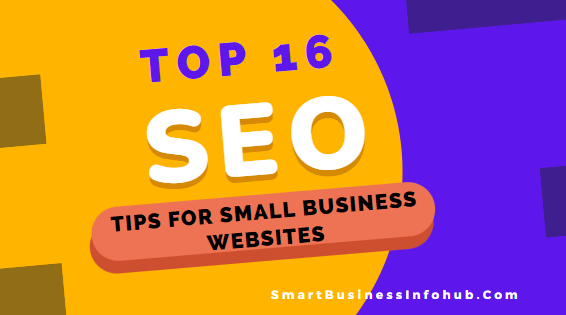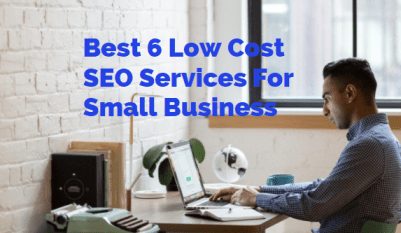It’s not worth investing the time and effort to build a stunning website if visitors cannot locate it.
What can you do to make your website stand out from the ocean of content over the Internet? the top 16 SEO tips for small business websites can can assist you.
SEO, also known as Search Optimization refers to the way to assist your users in finding your website when they seek it out using Google, Bing and Yahoo.
If you develop your site correctly and optimize your use of keywords research you’ll get more visitors to your site, and make a lot of money from sales.
Google search results have been increasing rapidly due to the fact that users are more likely to buy and order goods and services online.
What is SEO and how does it Works Small Businesses

Search Engine Optimization SEO, also known as SEO is the technique and set of techniques employed to increase the number of users who visit a website by gaining a top-ranking position on the search pages of search engines, such as Google.
What exactly is an Search Engine (like Google) How does it work?
A search engine performs three major functions: 1.)) to search the internet .) to build an index which gives a weight to the search results, and lastly,) to provide users with a list of ranking websites that they have found to be top of the best.
A search engine, such as Google searches the entire web by analysing every link to build the most comprehensive list of each website, and then uses their algorithms in order to establish the ranking of sites based on their relevance.
So the next time you seek out “Divorce Lawyer”, “Best All-Wheel Drive SUV”, or ‘Best Apple Pie Google’s search engine will provide an organized list that will include the top results on one page. It’s page 1. It’s the page you’d prefer to appear on.
Utilizing strategies or tactics to increase your website’s visibility in the results is called SEO. Here is How To Get Your Website On Top Google Search
The importance of SEO for Small Businesses Websites & Companies
They look up destinations to travel to and restaurants to visit or where they can repair their car or fixed, what lawyer can help them with mediation, and just about every other kind of business or service you could think of.
Your websites must show your business on Google results in order for your company to keep attracting new customers who are of high quality.
Being visible at the top of Google will make the difference of appearing or being left behind by your competitors.
The more visibility you can get through optimizing your website’s performance to be search engine friendly, the greater visibility your website gets and the more traffic you will receive, and the more customers you are able to attracted.
SEO tips for Small Businesses
That is what makes SEO an essential channel for any small sized business. If you’re not using SEO for your small business websites you’re helping your competitors to take over your business. This 3 Top SEO Guidelines To Search Engine Marketing will help you achieve your SEO goals .
Today, SEO is an investment and not an expense.
Top advantages of SEO for Small Business Websites
- It’s an affordable and high-ROI marketing method.
- You can receive free leads, traffic as well as customers to your business , without having to pay a cent.
- SEO traffic is of high-quality traffic.
- It will help you establish a name for your small-scale company.
- It’s an exciting time to get into marketing.
- SEO is an excellent method of winning over opposition.
The primary reason I like SEO is the fact that you can outdo big brands with it even if you don’t have the funds to invest. It’s not the case with other channels of marketing like PPC advertisements.
Here are some essential top 16 SEO Tips for Small Business Websites that will assist you with ranking your website for small business on Google and other search engine.
1. Create a professional, mobile-friendly business website.
One of SEO tips and tricks is that your website should be professional, and it should offer an enjoyable experience as well as the appearance of your brand visitors.
Here are a few suggestions to ensure your site is professional and SEO-friendly
- Include your logo and brand on your site.
- Make sure that your site has mobile compatibility ( more than half of local searches are mobile)
- Your site should be up and running with speed within not more than 3 seconds.
- Make sure you choose a clean minimalist design and stay clear of fancy designs.
- Your website must be well organized and easy to navigate.
A lot of business owners waste their money on creating professional small-sized business website. However, there’s no need to spend a lot of money for a website for a business.
You can build a professional site with under $400. Don’t waste money on web design, instead put that extra cash into SEO and advertisement.
Google has now begun to consider the mobile-friendliness of your site. This could influence the ranking of your site in results for search.
The change took place on April 21 of 2015 and changed the world of SEO in such a way that it was named “Mobile-geddon”.
It’s now having a bigger impact on results for mobile-friendly websites but the world is still moving from desktops to mobiles , which is why it’s reasonable to assume it’s likely that having a mobile-friendly site is going to become more essential in the near future.
- Test to determine whether your site is responsive. It’s easy to run this test on mobile devices on your site..
- It is essential to ensure that your website is regularly updated to make it responsive and mobile friendly.
Contact the service provider of your current website to inquire whether their website is mobile-friendly and responsive. If it’s not, ask about the price it’s going to cost to create your site mobile-friendly.
2. Choose keywords that will yield profits.

The success of your SEO campaign depends on the keywords that you decide to focus on.
This is why it’s important to choose which are the most efficient and efficient keywords for your small business websites. Each keyword has its own unique characteristics.
Certain keywords could be searched on a lot, but not earning any money, while some keywords can be profitable but only with low volumes.
Also, it is crucial to search for long-tail keywords as they are less difficult to rank and more profitable than short keywords. The success of a keyword is dependent on the quality of the word.
In order to achieve this, it is essential to be aware of the motivation behind the term and the motive behind why people are seeking this.
For example, when you are searching “ice cream” on Google is seeking to know more about Ice cream. It’s an informational goal. If, however, you search for “best choco-milk ice-cream close to me” This is an attractive keyword to choose to.
It is important to choose an appropriate keyword. It’s nearly impossible to get your website to be ranked for a term like “cheap hotels’. Check this Top 13 Free Keyword Research Tools for Bloggers
In this SEO Tips for Small Business Websites, It’s recommended to focus your search on a only a little bit and combine your knowledge with the name of your brand or business location to improve your likelihood of being found
3. Create an individual page for each of the items.
I observed that a large number of small-scale businesses display all their products on one page, which is similar to the homepage, but this isn’t the most efficient approach to take. If you want to get better results from local SEO efforts , it’s suggested to make distinct webpages for every product. This will make you more prominent on each product’s webpage, with multiple keywords.
For example, if you own a clothing store website, you’ll need to create separate pages for each product, such as jeans pages as well as one dedicated to shirts. You can also create subpages to other pages like men’s Blue Jeans. This could boost your rankings and increase the amount of money you earn. This can also help you save time.
4. Use Schema.
Structured data helps Google to better understand websites. This is the reason it can help your website rank better and gain benefits from other SERP features, such as featured snippets of content, knowledge graphs,.
Local business schema, product schema FAQ, and other are essential schema types to use for any business.
5. Optimize your search for “near me” and voice search results.
As I’ve said before about 1/3 of all search results originate from specific to local “near me” search results, which is the reason you need to improve your site’s performance to be able to cater for local searches.
However, over half of these are voice-based search results. Your website should be optimized to cater to both.
6. Maintain your business listings up-to-date.
Small-scale businesses, profiles on business listings like Google My Business (GMB) are crucial. A GMB profile will assist you in ranking on Google and gain new customers for your small-scale business.
It is the reason you should improve your GMB profile to the best of your ability and update it with the most current information that include working hours, pictures telephone numbers, email addresses and more.
People will be able to discover more about your company and are able to contact you and purchase from your.
7. Build Good backlinks
Good link building and backlinks are crucial elements of an effective Local SEO campaign. It is possible to ask your business partners local business directories, local business directories local newspapers and more to promote and link to your company. So therefore build a good backlinks to your website. In having a good backlinks for your small business, this Top 7 Benefits of Link Building For SEO can help you.
8. Create Meta titles and descriptions to the main pages of your website.
The inclusion of page Metas to your site helps users and search engines get a better understanding of what information is accessible on your site.
There are three primary tags: (1) Title, (2) Description, and three(3) Keywords. It is essential to change the meta title of your page and meta description of your page. Keywords aren’t as important in SEO and we’ll not bother with them.
- Page Metas can be added to your site via HTML or an editor within your site’s CMS. Ask your provider of your website how you can edit your page meta. Follow the easy formulas below for the title and description of your content.
- Its Title tag is thought to be one of the most crucial elements to optimize your website. Many search engines pay close interest to the keywords used inside the text of the title. Additionally they typically display the content of the title tag in their results. You should use an informative title that explains clearly and succinctly manner what your company offers and the content on each page. Make sure to limit the length to 55 characters so that you don’t get it cut short (the most feared …) by an engine. ex. “Anderson Law are Expert Divorce Lawyers in Toronto”. We employed a basic Who, What, Where formula to create our title tag.
- Description meta tags are used to describe the content of your website. Meta tag for description is utilized to enhance the title, and concisely describe the content and nature of the website page. It improves your SEO as it encourages clicks to your site from search results listings. It is placed under the title tag on Google results for search. The description should be written to be useful, keyword rich and persuasive enough to make someone want to come to your website. Limit the length to around 150 characters total.
9. Optimize your images on your website to improve SEO (including the file’s size the filename, file size as well as alt tags).
Optimizing your images for SEO is as crucial as optimizing the content of your site. Make sure you are careful when you add images, and ensure you’ve put the appropriate elements.) aid Google’s algorithm in understanding the meaning of your image and) help your users experience improve your rank.
- The first thing to do is ensure your image is relevant. As we’ve mentioned in how to obtain great images for your site Nothing is more damaging than metaphorical imagery . It does not support your site’s content and isn’t working in the direction of getting your site noticed.
- You’d like Google to understand the content of your picture without looking at it. When naming your file Use a brief description of what the image will be. If your image is a small-business owner working at a desk, do not use the name, for example, “DSC1387.jpg”. Instead, use something straight to the point like, “small-business-owner-at-desk.jpg”.
- Always Include An Alt Tag (or attribute tags) for each photo. They’re important because they’re an additional feature of your site which weighs on your rank in search results on Google. Try to include (or modify) the subject matter of your site within the alt tags providing a description of the image.
- Reduce the size of your file and make your images larger. It seems “nit-picky” however if you’ve got an image with a size of 2500×1500 pixels and you’re posting it in a size of 250×150 on your site The entire size needs to be loaded. What is this got to do with relate to SEO? The user experience is considered into the index of your search engine’s ranking. Larger images take longer to load, which affects the user experience. If a webpage takes a long time to load due to your images are too big it will affect your rankings.
We know that you’re an owner of a small-sized business and aren’t an SEO-certified marketer. This is why we’re starting from the bottom by starting with the basics.
This is an SEO guide for novices. Guidelines, we’ll continue with a more advanced level so you’ll be able to improve your understanding and skills gradually.
This is just one step in leveraging your website for your small business to expand your business Be sure to look over our various hubs to find simple and fast strategies to expand your business.
10. Don’t overwhelm your site with terms and phrases.
According to Google’s webmaster guideline: “Make pages primarily for people, not just for the search engine.”
If you’re just sprinkled keywords throughout your posts, you run the risk of creating confusion and making readers uncomfortable. Don’t go overboard.
Your goal is to make the text simple and easy to comprehend.
11. Link to your site
The more websites that have links to your website The more sites you have links to, the better you’ll get on Google searches. Contact the owners of the related sites to add links to your website. Offer to include links to their sites to exchange for links on your site. This Top 7 Benefits of Link Building For SEO can help you.
Be sure to look at your website’s quality hyperlinks. A link to your site from chamber of commerce or university’s website can give you more than a dozen other links from websites that are not well-known.
12. Produce high-quality content
The primary goal for search engines is to assist users find the answers to their queries. The best method to attract a lot of visitors is to create engaging material–articles, videos and photos that are informative for your viewers. It is important to keep your content regularly to ensure it is current.
A well-planned strategy for content can also establish you as an expert in your area of expertise.
13. Be social

Social media can be an excellent partner to your SEO strategy because people utilize social media platforms to search. People will often search for businesses or products via Facebook’s search feature for instance.
The profile of your company’s social media page will also be listed in results of searches when people look for your business or similar keywords. This Top 6 Basics of Social Media Marketing All Marketers Should Know
14. Check that your website is easy to use
Create a tidy, easy-to-use website that is easy to navigate. Be sure that it is immediately evident to users of who you’re, and also what services you’re providing.
Use lots of headings to increase readability and also include your keywords inside the headings. The headings will stand out to search engines and can assist in ranking better.
The speed of your website is crucial for SEO. The one thing you do not would like to do is disappoint your customers with a slow website.
15. Be patient
Check the results starting on Day 1. But don’t count on immediate results. It usually takes months to see a dramatic increase in the search engine results.
Remember also that SEO is always changing. What works today may not be as effective in three or two years. Continue to work on it and keep up-to-date with the latest developments that impact rankings. So just be patient while growing your search visibility.
16. Aim high, Dream Big
A majority of your users will not be able to get beyond to the top of results. A good rank means being in the top two results pages. After page three, nearly no one will even see your site. Make sure you’re on top of the list!
Conclusion
As the director of a company that specializes in digital marketing as well as a marketing expert I’m able to tell you the following: This SEO Tips for Small Business Websites can be a good investment option for small-scale businesses and you should be aware of it if are looking to be successful in the near future and expand your small-scale business websites.
Use these top 16 SEO tips for small business websites strategies to ensure your website is ranked high on Google and increase your revenue by implementing very bit of the information listed.
Please kindly Like and Share this post.










